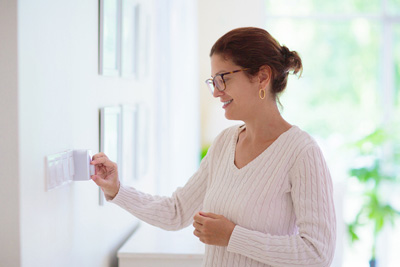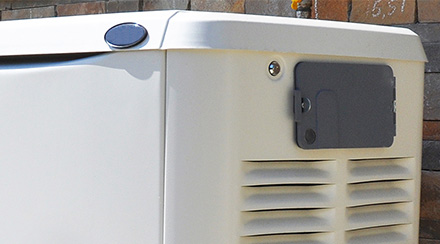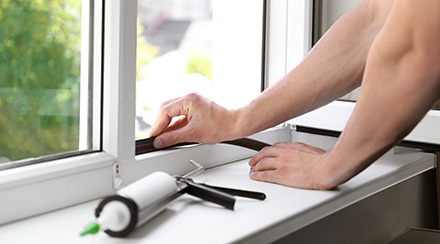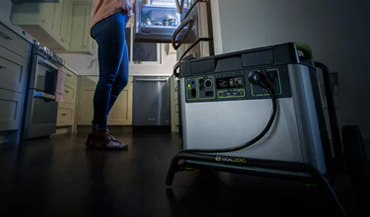Air Conditioner Electricity Use and Energy-Saving Tips

On a hot summer day, a cool blast from your air conditioner can feel priceless. But the reality is that cool air comes at a price, and there are a lot of things you can do to drive that price down! Before we get into energy and money-saving tips, though, we should take a quick look at how air conditioner electricity consumption can vary from one system to the next.
How Many Watts Does an Air Conditioner Use?
Air conditioners come in all shapes and sizes, and include portable window units as well as central air conditioning systems. When picking out a new air conditioner of any type, it’s important to choose a size that corresponds with the amount of space you’re trying to cool. A unit that is too small will struggle to cool the space, while a unit that is too big will consume excess energy and be less effective at dehumidifying.
Window air conditioners may consume between 500 and 1,400 watts, and central air conditioners may consume between 3,000 and 4,000 watts, according to Energy Sage. You can check your air conditioner wattage in the original documentation or by looking for an information label on the appliance itself. But when shopping for a new air conditioner, it’s especially helpful to look for the black and yellow EnergyGuide label. Required by federal law, this label shows standardized energy efficiency information that makes it easy to compare the estimated operating costs of different models.
Saving Energy and Money With Your Air Conditioner

Want to be cool and comfortable, but without the sky-high energy bills that come with round-the-clock air conditioner use? Make a few small changes that can add up to big energy savings:
- Tune up your air conditioner every year. You should hire a licensed HVAC technician to perform this annual service, ideally before the warm weather arrives. An annual tune-up is essential to the safe, continuous and energy efficient operation of your system, and it’s the best way to catch and fix problems while they’re small and inexpensive.
- Change your HVAC air filter regularly. Some disposable filters should be replaced monthly, while pleated filters may have longer replacement intervals. If your home is especially dusty or if you have pets, you may need to replace your filters more often than is recommended. Dirty air filters restrict airflow through your system, which reduces energy efficiency and can accelerate wear and tear on system components.
- Keep your vents clear. Arrange furniture, rugs and decor so that there are no obstructions covering or blocking your vents. You should also vacuum the vents periodically to remove dust.
- Seal your ducts. Leaks in your ductwork may mean you’re losing cool air to areas that don’t need it, like your basement or attic. You can use aluminum foil tape or mastic sealant to repair leaks in the ductwork you can reach, but some sections of your duct system may be inaccessible from the outside. Duct repair professionals can inspect your duct system to test it for leaks, and if they find leaks in inaccessible areas, they may be able to seal them from the inside by spraying a rubberized membrane with special equipment.
- Insulate your ducts. Duct insulation is relatively inexpensive and easy to install on accessible ductwork. This can help cool air on its way to your vents, and can be especially useful in large homes where air has to travel longer distances.
- Upgrade your existing insulation. Adding insulation to your walls can be a big and expensive job, but adding it to your attic floor can be a DIY project. This is a critical layer of insulation during the summer because it blocks out superheated attic air. If you’re not sure whether your attic insulation is due for an upgrade, consider scheduling a professional home energy audit. With this service, technicians can use heat-detecting imaging equipment to determine whether unwanted heat is seeping through.
- Seal air leaks throughout your home. Those areas that feel cold and drafty in the winter may also be where your cool air is escaping during the summer. A home energy audit is also a great way to pinpoint these leaks, but you can find them yourself using a device called a smoke pencil. When you find air leaks, seal them using caulk, spray foam, weather stripping or whatever solution is the best fit for the location.
- Keep your AC compressor free of dirt and debris. These units are designed for all-weather operation, but you should make sure there’s plenty of air clearance on all sides. Trim grass and brush away from the compressor, and promptly clear away leaves, tree branches and windblown debris.
- Upgrade your thermostat. Smart and programmable thermostats have features that make it easier to save on energy when your home is empty. Some thermostats even have learning features that schedule and adjust your thermostat automatically.
- Take it one degree at a time. If you usually set the thermostat to the same temperature during the summer, try increasing it by one degree. If you’re still comfortable, increase it by another degree. Every degree matters when it comes to energy savings, and you may find that your most comfortable temperature is a little higher than you thought.
- Close the shades. Blocking out heat from the sun is one of the most effective things you can do to keep your home cool during the day. Any shades or blinds can help, but insulated or heavy drapes are best for blocking out heat.
- Dress for the occasion. If you’re just lounging around at home, dress as lightly as possible so that you can set the thermostat a little higher without being uncomfortable.
- Turn on the fan. Overhead fans should rotate counterclockwise during the summer to create a cooling downdraft. Whether you use an overhead fan or a plug-in model, be sure to take advantage of the cooling effect by raising the thermostat a bit. And don’t forget to turn off the fan when you leave the room – fans only cool people, not air.
- Wait until later to use your heat-generating appliances. During the hottest hours of the day, your clothes dryer, dishwasher and oven can diminish the cool air your air conditioner is working so hard to produce. By saving the use of these appliances until after dark, you’ll give your air conditioner a fighting chance.
- Replace your air conditioner when needed. Installing a new air conditioner can be a significant expense, so it makes sense to want to delay it for as long as possible. But an aging air conditioner can really start to cost you if its energy efficiency is in decline. Talk to your HVAC technician about the condition of your air conditioner each year when you have your tune-up performed. Try to anticipate the need to replace your system by a few years so that you have time to create a financial plan if necessary.
Cranking down the thermostat is an easy way to keep cool, but an expensive one. This summer, take a more diversified approach to home comfort by implementing some of these energy-saving tips, and see how much you can save!
If you’re looking for even more ways to feel cooler at home while using less energy, you might want to invest in some home improvements. Our guide to weatherizing your home for summer offers advice for making your home more energy efficient, especially when it comes to your cooling equipment. For ways to save money, we've put together tips to help you lower your electricity bill in the summer.
Looking for Something Specific?
Select a category to find resources for topics that interest you.
Select Category

Related Articles:

What to Do Before, During and After Power Outages
With a little knowledge and preparation, you can protect yourself, your home and your belongings during power outages of any duration.
Read Article
How to Choose a Generator for Your Home
Power outages can be miserable, but with the right generator, you can keep your family safe and comfortable until power is restored. Learn how to choose the best generator for your home.
Read Article
Weatherize Your Home for Summer
The extreme heat of summer can really do a number on your energy bills. But if you’re able to invest a little time and money into weatherizing to keep your home cool, you can help yourself and your family remain comfortable at home while still saving energy.
Read ArticleMost Popular Articles

Power On the Go
GoalZero's portable and whole-home power products help you get the energy you need, whenever and wherever you need it. Learn More.
Air Conditioner Electricity Use and Energy-Saving Tips
On a hot summer day, a cool blast from your air conditioner can feel priceless. But the reality is that cool air comes at a price, and there are a lot of things you can do to drive that price down! Before we get into energy and money-saving tips, though, we should take a quick look at how air conditioner electricity consumption can vary from one system to the next.
How Many Watts Does an Air Conditioner Use?
Air conditioners come in all shapes and sizes, and include portable window units as well as central air conditioning systems. When picking out a new air conditioner of any type, it’s important to choose a size that corresponds with the amount of space you’re trying to cool. A unit that is too small will struggle to cool the space, while a unit that is too big will consume excess energy and be less effective at dehumidifying.
Window air conditioners may consume between 500 and 1,400 watts, and central air conditioners may consume between 3,000 and 4,000 watts, according to Energy Sage. You can check your air conditioner wattage in the original documentation or by looking for an information label on the appliance itself. But when shopping for a new air conditioner, it’s especially helpful to look for the black and yellow EnergyGuide label. Required by federal law, this label shows standardized energy efficiency information that makes it easy to compare the estimated operating costs of different models.
Saving Energy and Money With Your Air Conditioner
Want to be cool and comfortable, but without the sky-high energy bills that come with round-the-clock air conditioner use? Make a few small changes that can add up to big energy savings:
- Tune up your air conditioner every year. You should hire a licensed HVAC technician to perform this annual service, ideally before the warm weather arrives. An annual tune-up is essential to the safe, continuous and energy efficient operation of your system, and it’s the best way to catch and fix problems while they’re small and inexpensive.
- Change your HVAC air filter regularly. Some disposable filters should be replaced monthly, while pleated filters may have longer replacement intervals. If your home is especially dusty or if you have pets, you may need to replace your filters more often than is recommended. Dirty air filters restrict airflow through your system, which reduces energy efficiency and can accelerate wear and tear on system components.
- Keep your vents clear. Arrange furniture, rugs and decor so that there are no obstructions covering or blocking your vents. You should also vacuum the vents periodically to remove dust.
- Seal your ducts. Leaks in your ductwork may mean you’re losing cool air to areas that don’t need it, like your basement or attic. You can use aluminum foil tape or mastic sealant to repair leaks in the ductwork you can reach, but some sections of your duct system may be inaccessible from the outside. Duct repair professionals can inspect your duct system to test it for leaks, and if they find leaks in inaccessible areas, they may be able to seal them from the inside by spraying a rubberized membrane with special equipment.
- Insulate your ducts. Duct insulation is relatively inexpensive and easy to install on accessible ductwork. This can help cool air on its way to your vents, and can be especially useful in large homes where air has to travel longer distances.
- Upgrade your existing insulation. Adding insulation to your walls can be a big and expensive job, but adding it to your attic floor can be a DIY project. This is a critical layer of insulation during the summer because it blocks out superheated attic air. If you’re not sure whether your attic insulation is due for an upgrade, consider scheduling a professional home energy audit. With this service, technicians can use heat-detecting imaging equipment to determine whether unwanted heat is seeping through.
- Seal air leaks throughout your home. Those areas that feel cold and drafty in the winter may also be where your cool air is escaping during the summer. A home energy audit is also a great way to pinpoint these leaks, but you can find them yourself using a device called a smoke pencil. When you find air leaks, seal them using caulk, spray foam, weather stripping or whatever solution is the best fit for the location.
- Keep your AC compressor free of dirt and debris. These units are designed for all-weather operation, but you should make sure there’s plenty of air clearance on all sides. Trim grass and brush away from the compressor, and promptly clear away leaves, tree branches and windblown debris.
- Upgrade your thermostat. Smart and programmable thermostats have features that make it easier to save on energy when your home is empty. Some thermostats even have learning features that schedule and adjust your thermostat automatically.
- Take it one degree at a time. If you usually set the thermostat to the same temperature during the summer, try increasing it by one degree. If you’re still comfortable, increase it by another degree. Every degree matters when it comes to energy savings, and you may find that your most comfortable temperature is a little higher than you thought.
- Close the shades. Blocking out heat from the sun is one of the most effective things you can do to keep your home cool during the day. Any shades or blinds can help, but insulated or heavy drapes are best for blocking out heat.
- Dress for the occasion. If you’re just lounging around at home, dress as lightly as possible so that you can set the thermostat a little higher without being uncomfortable.
- Turn on the fan. Overhead fans should rotate counterclockwise during the summer to create a cooling downdraft. Whether you use an overhead fan or a plug-in model, be sure to take advantage of the cooling effect by raising the thermostat a bit. And don’t forget to turn off the fan when you leave the room – fans only cool people, not air.
- Wait until later to use your heat-generating appliances. During the hottest hours of the day, your clothes dryer, dishwasher and oven can diminish the cool air your air conditioner is working so hard to produce. By saving the use of these appliances until after dark, you’ll give your air conditioner a fighting chance.
- Replace your air conditioner when needed. Installing a new air conditioner can be a significant expense, so it makes sense to want to delay it for as long as possible. But an aging air conditioner can really start to cost you if its energy efficiency is in decline. Talk to your HVAC technician about the condition of your air conditioner each year when you have your tune-up performed. Try to anticipate the need to replace your system by a few years so that you have time to create a financial plan if necessary.
Cranking down the thermostat is an easy way to keep cool, but an expensive one. This summer, take a more diversified approach to home comfort by implementing some of these energy-saving tips, and see how much you can save!
If you’re looking for even more ways to feel cooler at home while using less energy, you might want to invest in some home improvements. Our guide to weatherizing your home for summer offers advice for making your home more energy efficient, especially when it comes to your cooling equipment. For ways to save money, we've put together tips to help you lower your electricity bill in the summer.
Looking for Something Specific?
Select a category to find resources for topics that interest you.
Select Category

Related Articles:

What to Do Before, During and After Power Outages
With a little knowledge and preparation, you can protect yourself, your home and your belongings during power outages of any duration.
Read Article
How to Choose a Generator for Your Home
Power outages can be miserable, but with the right generator, you can keep your family safe and comfortable until power is restored. Learn how to choose the best generator for your home.
Read Article
Weatherize Your Home for Summer
The extreme heat of summer can really do a number on your energy bills. But if you’re able to invest a little time and money into weatherizing to keep your home cool, you can help yourself and your family remain comfortable at home while still saving energy.
Read ArticleMost Popular Articles

Power On the Go
GoalZero's portable and whole-home power products help you get the energy you need, whenever and wherever you need it. Learn More.







